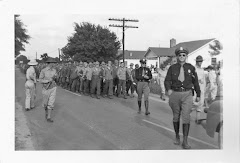
Synthia Catherine Stewart was nine years old when General William Tecumseh Sherman's troops marched into Georgia in 1864. Her father was off fighting with the Campbell Salt Springs Guards for the Confederacy http://walterstewart.org. She and her mother, her uncle, two sisters and a brother were among those who watched as Sherman's troops burned the New Manchester mill on the banks of Sweetwater Creek outside Atlanta http://www.friendsofsweetwatercreek.org. The six family members were then taken by wagon to Marietta where they boarded a train and made the trip north to Louisville, having been charged with treason for supporting the Confederacy. Synthia Catherine's story, and that of other mill workers at New Manchester and also at Roswell, Georgia, is told in the book North Across the River.
Synthia Catherine's great granddaughter Glenda Hilliard, who makes her home in Abilene, Texas, has shared wonderful memories of growing up with a great grandmother who survived that Civil War trip and then made a life for herself and her family in Texas.
Here, in her words, are some of those memories:
- Synthia Catherine and her family moved to Sidney, Texas, in 1903 when their youngest child (Glenda's grandmother) was seven years old They reared nine children of their own and six younger siblings after her husband's parents passed away. She was a wonderful grandmother and the heart of our family. She was loved by many and known as Granny Boyd by all in our small community.
- I will never forget the gatherings at her house where there was always lots of good food, love, laughter and many stories told. Her house was old and unpainted, without electricity, indoor plumbing, or running water, but we all thought it was a mansion because Granny lived there. It had a big front porch that held cane-bottomed chairs and rockers. There was a metal bucket on a small table with water and a dipper to drink from. We all drank from the same dipper and probably shared more than stories.
- Granny lived with her daughter, Rommie, and son-in-law in her latter years. He sold eggs and butter to the little grocery store in our town. They never had much money but were very frugal and always took good care of the things they had and never wasted a thing. Even their outdoor toilet smelled good. They kept ashes from the fireplace in a big bucket in the toilet to cover the "deposits" we made.
- Granny did all their cooking on a wood stove, and everything tasted like it was cooked by a famous chef. She always sent a surprise to me on Saturdays when her son-in-law came to Sidney to bring eggs and butter to the store to sell. It would be a pretty, handmade dress for my doll, pretty rocks or arrowheads, ostrich feathers, tea cakes that she had made on her wood-burning stove or anything she thought I might like. Then I would send her a surprise when he went home. I usually sent her a jar of maraschino cherries--her favorite--or some beautiful piece of artwork I had done.
- Granny had a great love for nature and all the beauty of God's creation. she often called me (on our crank telephone) to go outside to see a pretty cloud formation, an airplane (which was a rare occasion), or a ring around the moon.
- Granny died when I was eleven, and I thought I would surely die, too. She was such an example, and I feel sure I am a better person today because of her influence in my life. Everyone should have a great grandmother like Granny. All of the grandchildren thought that they were her favorite, but I knew that I was.
Synthia Catherine Stewart http://tattlingtales.com/Study-Guides/New-Manchester-Girl-Study-Guide.html lived to be 96 years old. She is buried in the Sidney Pendergrass Cemetery next to her husband.






